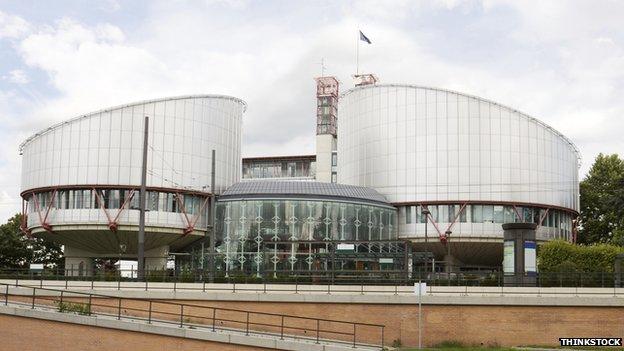European Court backs UK-Lithuania extradition
- Published

Seven judges at the European Court of Human Rights made the ruling
A Lithuanian man accused of serious offences including murders has lost his attempt to persuade the European Court of Human Rights to stop his extradition from the UK.
Kestutis Martuzevicius, who moved to the UK in 1996, was told his case was "manifestly ill-founded".
He has spent four years fighting extradition, saying he is mentally ill and must remain in the country.
Strasbourg's ruling, external means the UK can now extradite him to face trial.
In 2010, prosecutors in Lithuania issued a European Arrest Warrant for Mr Martuzevicius, accusing him of 22 serious gang-related crimes, including murders, robberies and extortion.
He was arrested and detained in HMP Belmarsh in south-east London, one of the country's most secure jails.
Two years after his arrest, he was said to be mentally ill - but was refused a transfer to Broadmoor high-security psychiatric hospital. In practice, a transfer would have meant he could not go on trial until he was deemed to be fit.
Unanimous decision
In 2014, he was treated at the hospital for about six months, before being transferred back to maximum-security prison. The High Court in London refused to stop his extradition being carried out.
Appealing against the extradition order, Mr Martuzevicius, who was born in 1962, argued that his transfer to Lithuania would breach article three of the European Convention on Human Rights - meaning that he would be at risk of inhuman or degrading treatment because of his mental state.
He also argued that he had been denied a fair hearing because his health had not been considered as part of the extradition proceedings.
In a unanimous ruling, seven judges at Strasbourg threw out the case on Thursday morning - and lifted the legal bar on his extradition.
The decision in the UK's favour is the latest in a long line of cases that the state has won at the court.
According to the latest figures, the European Court of Human Rights dealt with 1,997 applications in 2014 relating to allegations concerning the UK and threw out all but 27 of them. Four cases in the same year led to findings that the UK had breached human rights.